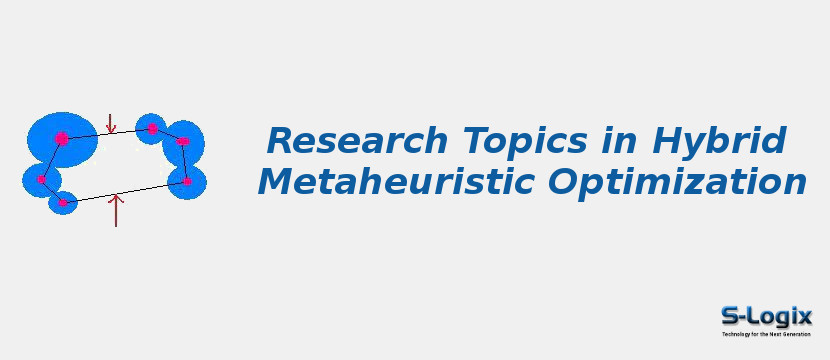Hybrid meta-heuristic optimization is a computational method that combines multiple meta-heuristics to solve complex optimization problems. The aim of hybridization in metaheuristic optimization is to enhance the performance of the algorithms by combining their strengths and overcoming their weaknesses. In a hybrid meta-heuristic optimization method, different meta-heuristics are integrated into various ways, such as:
• Sequential combination: One meta-heuristic is used to initialize the search, and another is used to improve the solution.
• Parallel combination: Multiple meta-heuristics are used simultaneously, each working on its portion of the solution space.
• Cooperative combination: Different meta-heuristics work together, exchanging information and guiding each other-s search.
• Genetic Algorithm-Particle Swarm Optimization (GA-PSO)
• Genetic Algorithm with Simulated Annealing (GA-SA)
• Particle Swarm Optimization-Differential Evolution (PSO-DE)
• Ant Colony Optimization-Genetic Algorithm (ACO-GA)
• Artificial Bee Colony-Particle Swarm Optimization (ABC-PSO)
• Harmony Search-Firefly Algorithm (HS-FA)
• Cuckoo Search Algorithm-Particle Swarm Optimization (CSA-PSO)
• Differential Evolution-Artificial Bee Colony (DE-ABC)
• Enhanced diversity: By integrating multiple meta-heuristics, hybrid meta-heuristics can explore different regions of the solution space, leading to a more diverse set of solutions.
• Robustness: Hybrid meta-heuristics are less sensitive to the parameters of individual meta-heuristics and can be more robust to changes in the optimization landscape.
• Flexibility: Hybrid meta-heuristics can be adapted to a wide range of optimization problems by selecting and integrating appropriate meta-heuristics differently.
• Reduced computational time: By combining the parallel and cooperative exploration of multiple meta-heuristics, hybrid meta-heuristics can often find solutions faster than single meta-heuristics.
• Increased reliability: Hybrid meta-heuristics can reduce the risk of getting stuck in local optima, as different meta-heuristics can search in different regions of the solution space.
Some of the current challenges in hybrid meta-heuristic optimization include the following:
• Integrating meta-heuristics: One of the main challenges in hybrid meta-heuristic optimization is finding the right combination of meta-heuristics and how to integrate them effectively. It requires significant experimentation and knowledge of each meta-heuristic strengths and weaknesses.
• Balancing exploration and exploitation: Hybrid meta-heuristics must balance exploration and exploitation in the solution space to find good solutions efficiently. It is challenging, as different meta-heuristics may have different trade-offs between exploration and exploitation.
• Parameter tuning: Hybrid meta-heuristics often have many parameters that must be tuned to achieve optimal performance. The optimal parameter values can depend highly on the optimization problem and the combination of meta-heuristics used.
• Scalability: Hybrid meta-heuristics can be computationally expensive, particularly for large-scale optimization problems, and not easy to scale them effectively.
• Evaluation and comparison: Evaluating and comparing the performance of different hybrid meta-heuristics is challenging, as the results can be highly dependent on the optimization problem and the specific combination of meta-heuristics used.
• Dealing with multiple objectives: Many optimization problems have conflicting objectives, and balancing them in a hybrid meta-heuristic approach can be challenging.
Hybrid meta-heuristic optimization has a wide range of applications across various fields, including:
• Engineering design: Hybrid meta-heuristics are used in engineering design problems, such as aircraft design, bridge design, and antenna design, to find optimal solutions.
• Logistics and supply chain management: Hybrid meta-heuristics are used to solve problems in logistics and supply chain management, such as vehicle routing and warehouse location.
• Financial optimization: Hybrid meta-heuristics solve financial optimization problems, such as portfolio optimization and risk management.
• Bioinformatics: Hybrid meta-heuristics solve problems such as protein folding, gene expression analysis, and drug design.
• Telecommunications: Hybrid meta-heuristics are used to solve problems such as network design, resource allocation, and traffic engineering.
• Data mining: Hybrid meta-heuristics are used to solve data mining problems, such as clustering, feature selection, and classification.
• Energy systems: Hybrid meta-heuristics optimize energy systems, such as renewable energy systems, smart grid systems, and energy-efficient buildings.
• Environmental problems: Hybrid meta-heuristics are used to solve environmental problems, such as waste management, water resources management, and air pollution control.
• Hybrid Metaheuristics for Continuous Optimization Problems: The application of hybrid metaheuristics to solve continuous optimization problems, such as the Rosenbrock function, the Rastrigin function, and the Schwefel function.
• Hybrid Metaheuristics for Dynamic Optimization Problems: The development of hybrid metaheuristics that can handle dynamic optimization problems, where the optimal solution may change over time.
• Hybrid Metaheuristics for Large-Scale Optimization Problems: The development of hybrid metaheuristics that can handle large-scale optimization problems with a high-dimensional search space and a large number of constraints.
• Hybrid Metaheuristics for Real-Time Optimization Problems: The development of hybrid metaheuristics that can provide real-time solutions for optimization problems with tight time constraints, such as in control systems and robotics.
• Hybrid Metaheuristics for Stochastic Optimization Problems: The developing hybrid metaheuristics can handle stochastic optimization problems where the objective function is uncertain or depends on random variables.
• Theoretical analysis of Hybrid Metaheuristics: The study of mathematical foundations and the theoretical properties of hybrid metaheuristics, such as convergence, stability, and scalability.
• Hybrid Metaheuristics for Artificial Intelligence: Integrating hybrid metaheuristics with artificial intelligence techniques, such as machine learning and neural networks, to address complex optimization problems.
